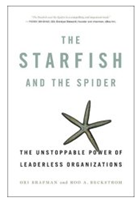 Earlier this year I was at dinner with Scott Allen of The Virtual Handshake and he slipped me a book that a friend of his wrote: The Starfish and the Spider. I finally cracked it open last night and read 30 pages – I couldn’t put it down! Today while on the plane I was able to finish most of the book (I have about 35 pages left) and I love it – this is one of the funnest books I’ve read. I’ll have a review in a few days but I wanted to bring out just a few things that really grabbed my attention today.
Earlier this year I was at dinner with Scott Allen of The Virtual Handshake and he slipped me a book that a friend of his wrote: The Starfish and the Spider. I finally cracked it open last night and read 30 pages – I couldn’t put it down! Today while on the plane I was able to finish most of the book (I have about 35 pages left) and I love it – this is one of the funnest books I’ve read. I’ll have a review in a few days but I wanted to bring out just a few things that really grabbed my attention today.
 Quoting Auren Hoffman, who is what they call a “catalyst” (as opposed to a power connector, a la Keith Ferrazzi – two different roles on being powerful):
Quoting Auren Hoffman, who is what they call a “catalyst” (as opposed to a power connector, a la Keith Ferrazzi – two different roles on being powerful):
“There are some people who believe in only having deep relationships with people, but then you’re limited to twenty close friends. Beyond those twenty, every other relationship is a weaker tie. I find a lot of value in those weak ties.”
Casual acquaintances fascinate him: “You can learn a lot, and you can meet really interesting people. Everyone’s interesting for at least an hour. And most people remain interesting well beyond that.”
Ori Brafman and Rod Beckstrom go on to talk about Auren for a few pages, and what makes him a catalyst… it is really intriguing and gives me a new, authoritative perspective on networking’s quality vs. quantity debate.

Auren is indeed a catalyst and anybody who knows him is better for the process. When you think of the term ‘shaker and mover’ think of Auren. His thoughts on QvQ are lucid, articulate and dead center. Read his bio to get a better snapshot of this human dynamo.
When Auren speaks I for one listen very closely.
Glad you’re enjoying the book!
You know, people may not realize it from our discussions on MLPF, but I’m actually a huge believer in the strength of weak ties. My point, and one that doesn’t come across here, is that merely having an electronic connection in LinkedIn or MySpace, or being members of the same discussion list, doesn’t constitute a “tie”, i.e., a relationship. It’s one common connection point on which to build a relationship, but it’s not a relationship.
As Auren said, “Everyone’s interesting for at least an hour.” But how many people have spent even an hour interacting with each and every one of their LinkedIn connections? Thomas Power has had one-hour face-to-face meetings with thousands of Ecademy members. He’s in a unique position to do that — most typical businesspeople simply can’t do that as a practical matter.
Of course, the reality is that relationship strength is a spectrum. Anyone can draw a line somewhere in a spectrum and say “there are two categories”. I could just as easily say, “There’s family, and then everyone else.” And relationships are multi-dimensional — there’s the level of intimacy, the level of bonding, the level of trust, etc., and they may not all be the same. It’s just not that simple, and systems like LinkedIn that basically force us to draw an arbitrary line somewhere in that spectrum create cognitive dissonance for us. On the other hand, make a system that’s as complex as human relationships and it will be impossible to maintain.
Never Eat Alone has a special place on my bookshelf (within arm’s reach) and the Starfish and the Spider will take a slot next to it. I am looking forward to reading it. Can’t have enough great advice!
There is a PDF-document by Ori Brafman and Rod Beckstrom over at ChangeThis titled
Changing the Rules: Lessons from a Starfish World.
https://www.changethis.com/27.03.ChangingRules
That is where I first learned about this starfish concept. I like this phrase in their text:
Size matters. There is power in being small.